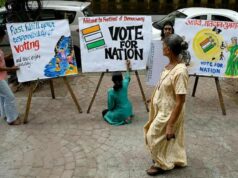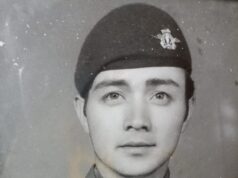Sunil Grover is a comedian and film actor. Trained in theater and a voice over artist, here is a side of him you didn’t know. Read more
Sunil Grover is more than just a naturally funny comedian. Known for playing loud, out-there characters, Sunil in real life is soft-spoken, laughs quietly and often gazes into the distance as he collects his thoughts. The Sunil Grover Masala! met the eve before his performance in Dubai was where we got to discover all this and more.
Sunil walked into the room wearing a white shirt and plain trousers, apologizing profusely for being late. He wasn’t late, at least not that much anyway but he apologized repeatedly. “I’m so sorry, we were up working very late last night,” he says, blinking into the sunlight. He offers tea, coffee, water, offers it again as we settle down to talk.
He speaks easily, but thoughtfully. There are plenty of jokes he cracks midway, he laughs sometimes as if he knows something you don’t know, if there’s a layer to the joke you may be missing. But he doesn’t laugh at you, or at your expense. All his jokes are on himself and he’s consistently comfortable in that zone.
Sunil rose to acclaim in his various hilarious avatars in The Kapil Sharma Show. The two had a much-talked about fallout after which Sunil ventured into independent comedy and appeared in Vishal Bharadwaj’s Patakha.
He is also set to appear in Salman Khan and Katrina Kaif’s upcoming film Bharat. Does he want to turn permanently serious? Comedian Jim Carrey, who made a career out of making people laugh, is now one of the most serious people you’ll see. What’s his take on that?
“See, comedians are intelligent people. That includes me!” Sunil laughs his easy chuckle. “What I mean by that – to make people laugh is very difficult. You need to have a sense – which is of course a sense of humor. You quoted Mr. Jim Carrey’s example. He’s been doing comedy for a very long time. I think after a point you begin to think – you need to do something else also. You can’t keep repeating yourself. I’ve done this comedy for a while. I want to branch out. I have got training in threater, drama.
Parallelly, if someone, a filmmaker like Vishal Bharadwaj trusts you and trusts your ability more than you trust yourself – I didn’t want to say to no to him. It was challenging, the character I played in Patakha. It had few layers. I got a few nominations for it too. It was quite encouraging.”
Is it something he would pursue in the future?
“I can think about it,” Sunil nods. “I can’t plan. Whatever has happened to me – knowing my luck – falls between the all the planning that I’ve had. I started my career with a news channel! I began working with a news channel after doing my masters in theatre. I never thought I would do voice-overs. But I was doing voice-overs for ten years for films, ads, commercials. I never knew such a career existed! I never had it in my wildest dreams that I’ll appear on radio either. I thought I’ll do drama … Things happen to me.”
“But you must have worked hard,” I point out. “Yes, they happen to you … but there must be an immense amount of hard work that you’ve put in to achieve what you have.”
“Everybody has to work hard,” Sunil answers shrugging slightly. “You can’t survive otherwise. Hard work, I don’t know why, is glorified. It is mandatory. I enjoy working. I am thankful. I’m working in a field where I wanted to work in. I make people laugh. I entertain them. Thank you for saying that I’ve achieved something but I haven’t done much. I’m grateful to whatever I’ve achieved, yes, and it took a little longer than it should it have. But I want to do a lot more.”
Sunil goes on to talk about the characters he represented onscreen, the ones that got him really noticed. Dr. Mashhoor Gulati, Gutti, Rinku Bhabhi were characters that people often know him for. In his hotel suite, two large dolls representing these characters were present. He laughingly talked about how people call him with those names in real life as well. “I have grown up with these characters,” he says, “I’ve only represented the life that I’ve seen growing up.”
“Do you think that is what resonates with people?” I ask. “I assume,” he replies. “But I love doing it. Maybe that’s the reason.”
Sunil appeared in various films like Heropanti, Baaghi and Gabbar Is Back. “What is the difference between big screen and performing in front of a live audience? What is more forgiving?” I want to know.
“The command perhaps,” responds Sunil. “Nothing is forgiving. A bad film is forgiving because people don’t watch it,” he jokes. “I’ve never seen it that way. Films as a medium are under control of someone else.
Once you’re on stage, things are in your hands. In films, the command is with the director. You’re the ‘mistri’. You can suggest to the director – but it’s the director’s call how he wants to approach. It’s his final call.”
Sunil’s social media handles ask a burning question. ‘Who is Sunil Grover’. Has he figured it out yet?
“No not yet,” Sunil answers shaking his head, smiling. “It’s like that verse from Baba Bulleh Shah … Bullah ki jaana’n main kaun (Bullah doesn’t know who Bullah is).”
Is there a particular role he’d like to do onscreen?
“I would want to do a biography, a historical character, a period piece,” says Sunil. “I love the storytelling of Ruskin Bond. Those kinds of stories are missing right now. Those characters may be comedy or not comedic. I’m trying to figure that out.”
So what is the stuff Sunil watches? “I want to watch a lot of things, I haven’t seen many. I’m looking at the trees and looking at the sky, I just can’t bring myself around to watching the series.
Whatever I’ve seen, I’ve seen a hundred times. Forrest Gump. Andaz Apna Apna. Ram Lakhan. Hum. Interstallar. Interstellar I had to watch multiple times because I couldn’t understand it the first time.”
The jokes on himself don’t stop. He brings it up again when we talk about the differences between the standup culture between the subcontinent and the western world.
I like the way that digital media is bridging the differences. Now there are many great comedians who perform and make people laugh. But,” he says after a poignant pause, “I’m still not comfortable with abusing onstage. Using cuss-words. I come from a small town. Maybe it’s the mindset I come from. It’s not that I don’t use cuss-words, I do. But I wouldn’t be comfortable using them in front of elders or kids or women. This is something I just don’t relate to. I’m old school. I want to see children coming to show and have fun with the family.”
Zoya Akhtar, when she made Gully Boy, said that she didn’t want the rappers to use abusive language because she wanted kids and families to see it. This could be the reason why the film was such a resounding success and didn’t become a small cult classic which it was in the danger of becoming, considering the subject. Does Sunil’s comedy work in the same way? How does he border that line between funny and offensive, given that what is funny is almost always pushing an envelope.
“I have boundaries,” says Sunil categorically. “I don’t want to disrespect their jobs, their work. I try and take jokes on myself. General jokes, happy-go-lucky ones. I’m okay with losing a few laughs here or there but I’ll compensate with something else.
I respect what people do, what their faith and religion is, whatever and wherever they were born. I respect that. I feel within that there’s so many things you can work with. You just need to have an eye. It’s about how you see things.”
We take our leave as Sunil prepares for his performance in the next few hours at the Sheikh Rashid Auditorium at the Indian High School in Dubai which is Colors Live Presents Sunil Grover Unplugged.
He thanks us, bowing slightly and he turns his attention back to a large group of men who are posing with him and speaking about many event-related items. Sunil’s got his plate full and it seems like his star is only on the rise.



